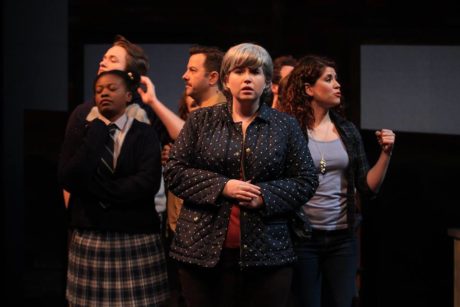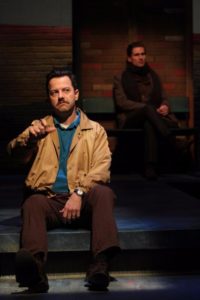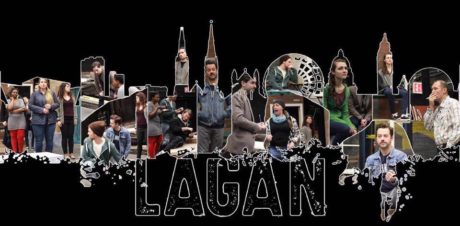About halfway through Villanova Theatre’s ultimately engaging production of Lagan, by Northern Ireland playwright Stacey Gregg, is a scene between two young people, Emmet (Patrick McAndrew) and Fiona (Kelly McAnally) who are certainly attracted to each other and, after some fumbles and hesitations, are in bed consummating their relationship.

The scene stands out for several reasons, none of them prurient. It solidifies Gregg’s ongoing narrative of people, nine out of 10 of whom are repressed, even in the peaceful, more open Northern Ireland of 2011, and have a hard time expressing their feelings and desire out loud, let alone acting upon them. Emmet and Fiona’s tryst is positive motion towards someone getting what he or she wants.
More importantly, it’s the first time in the Villanova staging deftly woven by director Kathryn MacMillan that I felt drawn to the play and became engaged in the dialogue, and intimacy, between two of its characters.
McAndrew and McAnally have a lot to do with this. Of all the actors in MacMillan’s cast, it’s McAndrew who continually made me pay more than polite routine attention to what transpires on the Vasey stage. His Emmet, whose brother was killed during The Catholic-Protestant “Troubles” in Northern Ireland, and whose mother recently ended her grief in a suicidal act that mirrors the way her son died, maintains a broody, lost cast that elicits sympathy and excites curiosity about the character.
Emmett is clearly in love with Fiona. The attraction is mutual, but both are clumsy about being direct about their emotions and coy about making definite commitments. The segment leading to the bedroom scenes, and bedroom scene itself, show the characters’ awkward attempts at courtship before they lead to an understanding and an act the audience congratulates. Their union feels right and is satisfying. Deepening the dramatic moment is the quiet way Emmet and Fiona talk to each other, joking sometimes, being serious and loving for most of it.
This is where Lagan clicks. It needed that simple, sincere, quiet talk between two characters to give it intensity and set it on course. Prior sequences were as much monologue and reverie as conversation. In instances when characters did talk to each other, they usually argued, complained, or explained a perceived wrong. Emmet and Fiona provide sustained, absorbing, easy communication between two souls. In doing so, they give Lagan a keystone. MacMillan’s production centers itself. For once, you’re not keeping track of the various issues, worries, and follies of characters who come in waves to tell their part in a large intersecting story. You’re focused on the singular moment when two of those characters bring their thread to a conclusion, one that invites you and makes you listen. One that engages you and makes you care.
Once McAndrew and McAnally create that moment, Lagan flows like the Northern Ireland river for which it’s named, one whose biggest port is Belfast where Gregg lays her scene.
It takes a while to feel the rhythm of Lagan. For the first 15 minutes of MacMIllan’s production, it plays like a disjointed set of individual stories, even though I understood that I was seeing sets of parents, children, and siblings and I was being made privy to their inner thoughts, whether gripes or hopes. Putting my arms around all the information imparted took time. Luckily, Gregg leavened her characters’ monologues with asides and jokes that amused and showed their humanity, perspective, perception, and sense of observation. Nikitas Menotiades, as a cab driver called Taximan, made the most of these offhand comments.
McMillan’s Lagan, in time, becomes a gentle waltz of meaningful encounters and of individuals sharing their thoughts and secrets, but it depends on who is speaking for much registers and resonates with the Villanova audience.
One thing that might help is starting the play upstage instead of at the furthest depth of Meghan Jones’s cleverly utilitarian set. I realize the Vasey stage is hardly cavernous, but it’s difficult take in the more salient parts of Chris Monaco’s opening monologue as Ian, a young man who has moved from Belfast to London to escape Northern Ireland’s attitudes towards homosexuality, because he seems distant, and his words are not clear enough to grab you from the outset. I found myself trying to catch germane snatches of Ian’s story instead of being acclimated to Gregg’s Belfast and interested in it. This opening would benefit from a clear, more direct presentation. If only to set up the play and its style more quickly and surely. I felt myself in a muddle for a full 10 minutes, sorting out information instead of processing it smoothly and gaining texture from it. Menotiades’s Taximan begins to provide some pace which Megan Slater’s Anne establishes, but there’s always the sense of catching up instead of being engaged in the moment.

Lagan follows a good Irish literary tradition. Like Joyce’s Ulysses, it takes its audience to several Belfast homes and locales, looking into lives that are interwoven and that are filled with concerns even if people make brave outward shows of their everyday normality.
Through the various problems that haunt the characters, problems you hear as much in reverie via monologues as in exchanges between Lagan’s denizens, you learn much about repression and moralism that continues in Northern Ireland even as the same matters are treated more casually in the rest of Great Britain or in the Republic of Ireland.
Abortion, lechery, and sensitivity about all matters sexual join Ian’s homosexuality as issues that take on a more urgent cast in a stringent country. While posing these matters, Gregg also addresses true love, grief, and in a seriocomic sequence, Anne’s adding nuts to a cake recipe to incapacitate a romantic rival she knows to have a nut allergy. The religious barriers that spelled Northern Ireland’s hardest time are also noted. Many of the characters have one parent who is Catholic and another who is Protestant, showing the easing of ancient tensions but also some complications from two ways of looking at some situations.
Nikitas Menotiades was always ironic and enjoyable as Taximan. In small roles, Luke Hensley nicely drew a teenage boy who is love with Allyce Morrissey’s sassy Aoife, not knowing Aoife was already pregnant and was conspiring with her brother, Ian, to go to London for an abortion. Sisi Wright was amusing as the youngest character, running through scenes oblivious to the cares of the teens and adults around her.
As usual, Janus Stefanowicz’s costumes perfectly suit the characters that don them. Jerrold Forsyth’s lighting in integral to MacMillan fading in and out of scenes and monologues while, at times, making its own commentary, such as indicating someone tends to live in shadows and another on the periphery.
Gregg has written a sweet and realistic slice of life that becomes amusing an affecting as it settles in. Appreciation of the play was immediate as Gregg has written a sweet and realistic slice of life that becomes amusing an affecting as it settles in. I am confident that the production will become even better as the run continues through February 19th.
Running Time: One hour and 45 minutes, with no intermission.
Lagan plays through Sunday, February 19, 2017, at Vasey Theatre on Villanova’s campus at Lancaster and Ithan Avenues. For tickets, call the box office at (610) 519-7474, or purchase them online.





